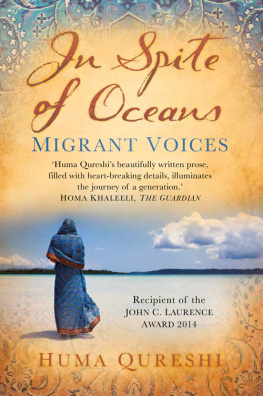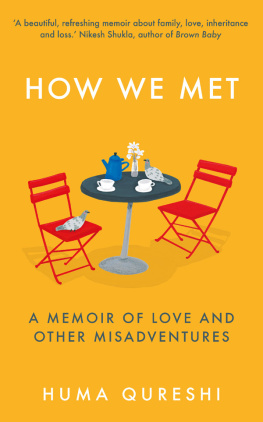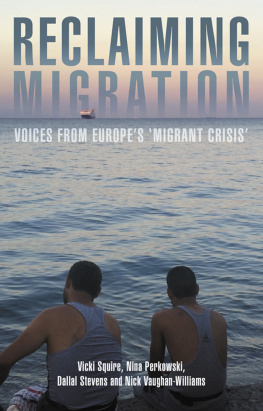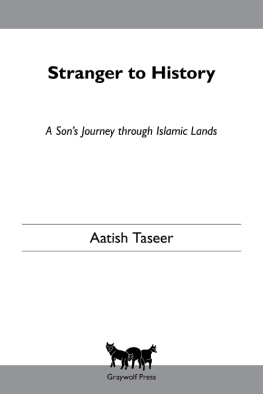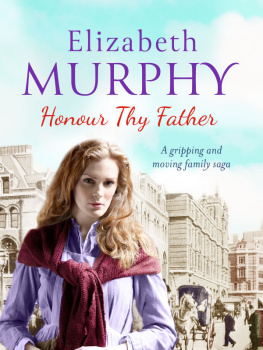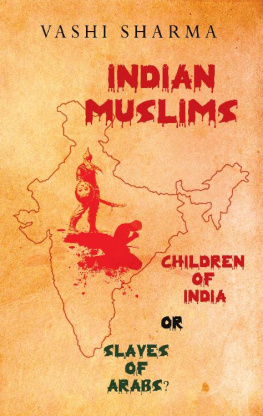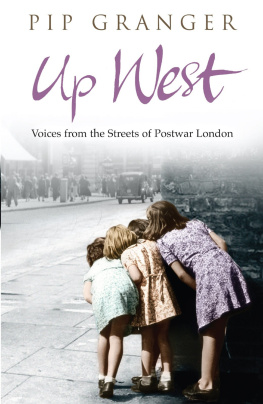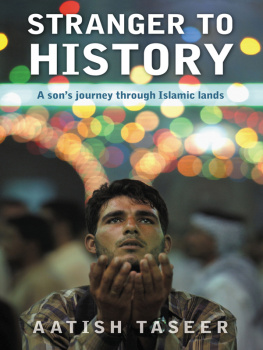
For Suffian
In spite of the ocean that now separated her from her parents, she felt closer to them, but she also felt free, for the first time in her life, of her familys weight.
( Jhumpa Lahiri, Only Goodness,
Bloomsbury Publishing Plc, 2009)
M y deepest gratitude to my publisher, Ronan Colgan, who read my writing and took a chance on me. Thank you, and everyone involved with the publication of this book at The History Press, for your patience and your confidence.
This book would never have been written were it not for the incredible individuals whose fascinating experiences inspired these stories. You shared with me your deepest emotions. I cannot thank you enough.
My heartfelt thanks to all those who helped with feedback on the early stages of this book. I am especially indebted to The Authors Foundation for selecting In Spite of Oceans for the John C. Laurence Award.
My talented best friend and fellow writer agreed to be my first reader. Thank you, Karen Onojaife. You are especially golden to me.
I could not have written this book without the support of every single member of my Qureshi and Birch family. You gave me the time and space I needed to write. All of you have been wonderfully patient with me.
I particularly thank my parents. My fathers memory lies somewhere in these pages. Amee, you remain an inspiration. Thank you for your unwavering belief in my many risk-taking leaps.
And also my brothers, Usman and Imran. Neither of you seem to think anything I write is bad and you both blow my trumpet for me at every opportunity in a way only big brothers can. I am one exceptionally and eternally grateful little sister. Saba, my sister-in-law, your infectious exuberance never fails to lift me. Thank you.
To my parents-in-law, I am humbled by your pride in me and I hope this book lives up to expectations.
And finally to Richard, who took care of our beautiful baby boy while I struggled with deadlines, self-doubt and writers block. You held the three of us together when I needed it most, at the times when I thought I would never be able to finish this book. You steady me each time I falter and have taught me to be kinder to myself, in spite of it all. For that, I thank you, always.
T here is a framed black-and-white photograph that sits on the window sill of my childhood bedroom. It is of a woman I never knew. And yet there it is, in a place that I still call mine.
She has unlined almond eyes, thick heavy eyebrows and jet black hair parted deeply, held tight in a stiff, shiny wave fixed to the side as, I suppose, was the style. Her sari is pinned to her shoulder and she wears rings on every finger of her clasped hands, a few thin bangles clustered at her wrist. She is my mothers mother, my naani, my grandmother.
She is not a smiling grandma; rather, her expression is halfway between sad and serious as she stares into the camera, her lips pressed together. She gives nothing away.
All I have of my grandmother is this, this old photograph in my bedroom in the house where I grew up in the West Midlands. There are no family jewels that have been passed along, no heirlooms that have stood the test of time. Even if there had been, it is not likely they would have travelled this far. Not across countries, continents and oceans, not all the way to England and not to me.
My grandmother died a long time ago. She died in Pakistan, far away from where she was born in Uganda. My mother, the second-youngest child of seven, was 14 years old when my naani passed away.
I dont know much about my grandmother. Growing up, I never thought to ask. But now that I am older, now that I think about these things more, I wonder. I wonder about heritage and history and how this woman that stares at me like a stranger so blankly and, if I am altogether honest, sadly from behind a frame is in some way a part of me, if she is at all. Tell me, I think, looking at her photo. Tell me who you were.
More recently, I have asked my mother about my naani, from time to time. But what she remembers of that short period in her life when she, too, had a mother is blurry now.
This is what happens when your roots are rambling, overgrown from one country to the other in a tangled, wild nest that is home to more relatives than you ever really know. Time passes, memories mix facts with fiction and people forget how they got to where they are. My family history is not ordered, neat and tidy, logically flowing from one generation to the next. I cannot point at this name or that on an inked family tree and say Yes, he owned this land, or He fought that war, or She came from this place, that I might then pick out on a map.
No, our story is not like that. My family history is the history of a family of immigrants. Many of my relatives, living or long gone, made their homes in different places starting first in pre-partition India and then in post-partition Pakistan, leaving a young country of unspoken promise to head further afield. One set of great-grandparents left to live in East Africa and work proudly for the British Empire. From there, one grandfather went to Saudi Arabia while the other engineered railways in the British Raj. Countless uncles and aunts forayed, one by one, out of Pakistan, followed by my own parents too, landing in England, where they stopped still; then cousins spiralling, now quickly and urgently, as fast as they can, to the Middle East, Australia and America. My big, extended family has spun like a spiders silk web everywhere for decades, delicate skeins of DNA held together across lands first in blunt, capitalised telegrams and papery aerogrammes, now in virtual messages that take merely seconds to send.
All of these people I am related to left the places they were born, the familiarity of language, of food and of the faces they loved, for something else. Some left in pursuit of what they thought would be better lives; others left for what they felt was duty. Many left to fulfil ambition which they would not in all their pragmatism dare call dreams.
Sometimes they struggled, sometimes it was too hard. Some returned to Pakistan permanently, to their homeland and their mother tongue, building new houses with foreign money and saying sadly with a smile, Well, we tried. Sometimes they fell in love with their new surroundings. Some of them, like my parents, stayed in one place, raising children who spoke differently to them and whose references of childhood were so far removed from what they once knew. It was us, the children, who rooted them steadfast in humdrum suburban towns that became home. And so, as years passed, places like Pakistan for my father or Uganda for my mother faded further and further away.
I may not have made the journey my parents made, but it is because of them that I am here, an adopted Londoner now. The choices they made long before I was born determined who I was to be and the path I would take. My past, surely, explains my present.
This is the connection I have explored in all of the stories that follow. The stories are inspired by people I have met. Some of them left south Asia behind and have long since made Britain their home. Others are like me, born and raised in one place but with a heritage from afar.
The people behind these stories have shared fragments of their quiet histories with me and I have, at times, filled in the gaps between the pieces they provided using my imagination. At these times, I have envisaged scenes and asked myself to wonder how some moments may have been. All the while, the essence of these individual experiences has been preserved.
Next page
